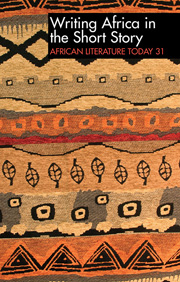Book contents
- Frontmatter
- Dedication: Chinua Achebe Joins the Ancestors
- Stop Press/ Tribute to Kofi Awoonor 1935–2013
- Contents
- Notes on Contributors
- Editorial Article
- Articles
- “Real Africa”/“Which Africa?”: The Critique of Mimetic Realism in Chimamanda Ngozi Adichie's Short Fiction
- Writing Apartheid: Miriam Tlali's Soweto Stories
- Articulations of Home & Muslim Indentity in the Short Stories of Leila Aboulela
- Ugandan Women in Contest with Reality: Mary K. Okurutu's A Women's Voice & the Women's Future
- Snapshots of the Botswana Nation: Bessie Head's The Collector of Treasures & Other Botswana Village Tales as a National Project
- Widowhood – Institutionalized Dead Weight to Personal Identity & Dignity: A Reading of Ifeoma Okoye's The Trial & Other Stories
- Feminist Censure of Marriage in Islamic Societies: A Thematic Analysis of Alifa Rifaat's Short Stories
- Diaspora Identities in Short Fiction by Chimamanda Ngozi Adichie & Sefi Atta
- Exposition of Apartheid South African Violence & Injustice in Alex la Guma's Short Stories
- Locating a Genre: Is Zimbabwe a Short Story Country?
- Mohammed Dib's Short Stories on the Memory of Algeria
- Ama Ata Aidoo's Short Stories: Empowering the African Girl-Child
- Ama Ata Aidoo: an Interview for ALT
- Reviews
Exposition of Apartheid South African Violence & Injustice in Alex la Guma's Short Stories
from Articles
Published online by Cambridge University Press: 05 December 2013
- Frontmatter
- Dedication: Chinua Achebe Joins the Ancestors
- Stop Press/ Tribute to Kofi Awoonor 1935–2013
- Contents
- Notes on Contributors
- Editorial Article
- Articles
- “Real Africa”/“Which Africa?”: The Critique of Mimetic Realism in Chimamanda Ngozi Adichie's Short Fiction
- Writing Apartheid: Miriam Tlali's Soweto Stories
- Articulations of Home & Muslim Indentity in the Short Stories of Leila Aboulela
- Ugandan Women in Contest with Reality: Mary K. Okurutu's A Women's Voice & the Women's Future
- Snapshots of the Botswana Nation: Bessie Head's The Collector of Treasures & Other Botswana Village Tales as a National Project
- Widowhood – Institutionalized Dead Weight to Personal Identity & Dignity: A Reading of Ifeoma Okoye's The Trial & Other Stories
- Feminist Censure of Marriage in Islamic Societies: A Thematic Analysis of Alifa Rifaat's Short Stories
- Diaspora Identities in Short Fiction by Chimamanda Ngozi Adichie & Sefi Atta
- Exposition of Apartheid South African Violence & Injustice in Alex la Guma's Short Stories
- Locating a Genre: Is Zimbabwe a Short Story Country?
- Mohammed Dib's Short Stories on the Memory of Algeria
- Ama Ata Aidoo's Short Stories: Empowering the African Girl-Child
- Ama Ata Aidoo: an Interview for ALT
- Reviews
Summary
Every oppressive system has witnessed a literature of protest that uses themes of violence, racism and conflict within the writers' ideological framework. It is the desire to change oppressive human history, to place man in a better position to understand his environment and subsequently harness his resources to boost his living condition that makes artists protest subtly or violently against factors that inhibit their quest. In South Africa, colonialism took the form of a settler colony, where land was forcibly confiscated and the owners reduced to the status of wage-earning labourers. The settlers, in order to perpetuate their authority over the Africans, devised several means of subjugating the indigenes. It is in response to this that writers like Alex la Guma, Peter Abrahams, Arthur Nortje, Dennis Brutus and others, have attacked the oppressors in their various works. This article explores the various ways in which Alex la Guma uses his short stories to expose the violence and injustice meted against the blacks in apartheid South Africa.
Leif Lorentzon in his 2007 article, ‘Jazz in Drums’, discusses how jazz music has integrated into African life and he also gives an idea of how short stories appeared in Drum from the early 1950s as ‘part of an urban black Atlantic and para-colonial/Apartheid popular culture in South Africa ….’ (218). Lorentzon continues the exploration by saying that,
With Drum there was a place for fiction during the fifties. Prior to this there was hardly anywhere for the black South African writers to be published. The short stories in Drum in the fifties mark the beginning of the modern black short story in South Africa … But like so much else it all ended before the decade was over: the last short story was Alex la Guma’s ‘Battle for Honor’ in November 1958. (219)
- Type
- Chapter
- Information
- Writing Africa in the Short Story , pp. 115 - 126Publisher: Boydell & BrewerPrint publication year: 2013

